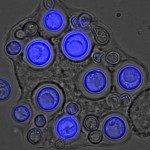Lien vers Pubmed [PMID] – 22162560
J. Clin. Microbiol. 2012 Feb;50(2):227-31
Quantitative PCR (qPCR) is more sensitive than microscopy for detecting Pneumocystis jirovecii in bronchoalveolar lavage (BAL) fluid. We therefore developed a qPCR assay and compared the results with those of a routine immunofluorescence assay (IFA) and clinical data. The assay included automated DNA extraction, amplification of the mitochondrial large-subunit rRNA gene and an internal control, and quantification of copy numbers with the help of a plasmid clone. We studied 353 consecutive BAL fluids obtained for investigation of unexplained fever and/or pneumonia in 287 immunocompromised patients. No qPCR inhibition was observed. Seventeen (5%) samples were both IFA and qPCR positive, 63 (18%) were IFA negative and qPCR positive, and 273 (77%) were both IFA and qPCR negative. The copy number was significantly higher for IFA-positive/qPCR-positive samples than for IFA-negative/qPCR-positive samples (4.2 ± 1.2 versus 1.1 ± 1.1 log(10) copies/μl; P < 10(-4)). With IFA as the standard, the qPCR assay sensitivity was 100% for ≥2.6 log(10) copies/μl and the specificity was 100% for ≥4 log(10) copies/μl. Since qPCR results were not available at the time of decision-making, these findings did not trigger cotrimoxazole therapy. Patients with systemic inflammatory diseases and IFA-negative/qPCR-positive BAL fluid had a worse 1-year survival rate than those with IFA-negative/qPCR-negative results (P < 10(-3)), in contrast with solid-organ transplant recipients (P = 0.88) and patients with hematological malignancy (P = 0.26). Quantifying P. jirovecii DNA in BAL fluids independently of IFA positivity should be incorporated into the investigation of pneumonia in immunocompromised patients. The relevant threshold remains to be determined and may vary according to the underlying disease.

